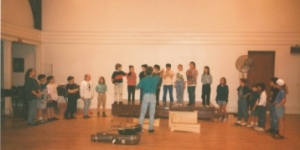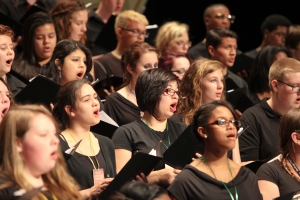Home » Posts tagged 'attention'
Tag Archives: attention
Universal Music Education

Nashville School of the Arts Festival Choir in performance, May 13, 2013, Blair School of Music, Vanderbilt University, Nashville (click images to enlarge)
As we enter the third decade of the twenty-first century, the time has come for music educators to stop pussyfooting around and advocate for Universal Music Education. Indeed, it is long past time. We should stop wasting valuable time – time that belongs to us and to the children in our care – we should stop seeking compromise solutions that merely seek to preserve music education’s place in school curriculums, a place that is in most cases completely upside-down, a place that has fallen into neglect and disrepute over that last decades, a place that was rarely or never ideal in the first place. It is time to advocate for what is truly needed by our children and our society: a comprehensive music education for every child in every school.
Concentration
 When I was 9 or 10 years old, my piano teacher assigned me a simplified arrangement of Scott Joplin’s The Entertainer. At that point in my piano study, I had not yet attempted to play anything that required such independence between my hands – this arrangement retained the typical ragtime style of a syncopated melody in the right hand set against the left hand alternating bass notes on the beat and chords on the division of the beat.
When I was 9 or 10 years old, my piano teacher assigned me a simplified arrangement of Scott Joplin’s The Entertainer. At that point in my piano study, I had not yet attempted to play anything that required such independence between my hands – this arrangement retained the typical ragtime style of a syncopated melody in the right hand set against the left hand alternating bass notes on the beat and chords on the division of the beat.
This piece was a struggle for me to learn, but it was the right piece at the right time. Despite the difficulty I had in coordinating my hands to play the two distinct rhythmic patterns against each other, I was captivated by The Entertainer and very motivated to learn it. My parents had taken me to see The Sting and had given me the film’s soundtrack recording on LP featuring Marvin Hamlisch’s marvelous arrangements of Scott Joplin’s original rags. So putting The Entertainer in my hands at that stage of my piano curriculum was timely on the part of my piano teacher and incredibly fortuitous for me. Thank you, Mrs. Stoike.
I clearly remember the day it happened.
The Count

Music City Youth Orchestra students warm up before a concert, May 22, 2011, Schermerhorn Symphony Center, Nashville
The Count is a concentration exercise – a group activity – that I used with my student ensembles in the last few minutes before going on stage for a performance. It is a very useful thing to do! and became something of a special ritual with my ensembles.
I didn’t invent The Count, although I had never heard it called by any name before my students began calling it this. I first encountered it in the early 1990s when I witnessed Ellen Provost, a teacher at Blue Rock School, use it with a group of 6th graders before the performance of a play – I believe it was either The Conference of the Birds or Monkey. I began using it myself at Carrollwood Day School years later, and it was at CDS that it became a regular practice – something I always did with my students before a performance, if possible, for the rest of my teaching career.
Learn Their Names First
The Name-Learning Stunt®
I urge every teacher who works with groups of children to do this. At the beginning of the school year, or whenever you are beginning to work with a group of students you do not know for the first time – or perhaps a group that is a new constellation, some of whom you know and some you do not – take the time to learn all of their names right from the beginning, and make a special effort to do so. It will take some time and effort, but will reap big rewards in the long run and begin your relationship with the students on a sound footing by demonstrating concretely that you care about them.
It occurred to me to write about this yesterday. I was making a “guest appearance” at a summer choral music day camp to work with a group of students I did not know – I was given a 45 minute period in which to bring them some singing activities. Without any consideration at all I planned to begin my work with them with the name-learning stunt (described below) that I developed at the beginning of my career, and which I used invariably whenever I found myself in front of a new group of students. I did this even though it used up several precious minutes of my brief 45 minute window, because I knew that if I did this first, the rest of the class would go so much better.
What Kind of Human Being Do You Want To Be?
Music Education and the Whole Child
This weekend I attended a chamber music recital presented by a small local community music school. Roughly twenty students from middle and high school presented an hour of short pieces for small ensembles: music for woodwinds and strings, with a couple of pieces featuring voice as well. The students represented a wide range of experience, accomplishment, and commitment; some of these children will go on to study music in college and perhaps even pursue professional careers as performers or educators, while others will likely put their instruments away for good by the time they graduate from high school.
Regardless of the differences in commitment for the students and their families – to say nothing of the teachers – all of them clearly regard music as an important part of their lives. Parents make it possible for their children to attend weekly lessons and regular ensemble rehearsals, have the instruments and other materials they need, and the students must exert consistent effort over a long period of time (years) to learn how to play their instruments and develop at least enough acumen that they derive satisfaction from the process.
Why do they do it?
Trust
This article is a companion to my previous post Wholehearted Attention.

from my Instagram feed: Nashville Symphony Education & Community Engagement Program Manager Kelley Bell guides a young guest in playing his first notes on the trumpet before our Community Concert at Centennial Park, Nashville, June 4, 2015
It’s generally accepted that one of the goals of education – beyond the attainment of specific content objectives – is to instill in the child a love for learning. It has been my experience however, that a love for learning is part of a child’s natural state and does not need to be instilled. Children who exhibit behavior to the contrary have most often faced social and/or emotional difficulties that impede their inherent wish to learn and grow; some of a teacher’s work involves trying to determine what these obstacles are and finding ways around them. Beyond providing the child an acquaintance with and proficiency in the broad array of subjects necessary for success in life, the overarching goal of education might be better described as enabling the child to become her own teacher.
Wholehearted Attention
Music teachers in school settings often feel a sense of isolation from the activities happening in other classrooms, and a lack of understanding on the part of other teachers and administrators about what it is, exactly, that music teachers teach. There are striking differences in the way teaching and learning happens in the music classroom when compared to the activities happening in other classes. In the current standards-obsessed education climate, appropriate musical activity in the classroom faces real obstacles in being appreciated, understood, and ultimately funded, because it resists being reduced to a checklist of objectives.
Which is not to say that there are not discrete objectives for a music teacher to impart to his or her students – quite the opposite, in fact. Music-making is such a complex activity that the act of separating all the components that go into it into easily assessed bytes of information ultimately leaves out essential aspects of what it is really about, presenting an incomplete picture at best, and at worst, a distorted view of the purpose and value of musical activity.



